Category: Covid19

If you missed the Global Dialogues on Community Media in the Post-Pandemic World that took place during the summer of 2020, you can now revisit the discussions (see below). The meetings were curated & hosted by UNESCO Chair on Community Media Dr. Vinod Pavarala.
Global Dialogues, Community Media in the Post-Pandemic World 8. Community is the Answer:
Community Radio in Continental Europe – Part – 1
Panellists
- Nicolas Horber, Executive Officer, Radio Campus France
- Ragnar Nils-Olof Smittberg, President, NRO, Swedish National Organisation for Community Radio
- Ákos Cserhati, Founder, Civil Radio, Hungary
- Fabian Ekstedt, Board Member, Bundesverband Freier Radios (German Federation of Free Radios)
- Helga Schwarzwald, Managing Director, Verband Freier Radios Österreich–V-FRÖ (Austrian Association of Free Radios)
- Isabel Lema Blanco, ReMC (Spanish Network of Community Media)
Moderators
- Birgitte Jallov, President, Community Media Forum Europe (CMFE)
- Michael Nicolai, President, AMARC Europe
Global Dialogues, Community Media in the Post-Pandemic World 9
Strengthening Community Radio: Continental Europe Part – 2
Panellists
- Stephanie Scholz, Radio Corax, Halle, Germany
- Miranda Moen, RadiOrakel, Oslo, Norway
- Lisa McLean, ARA City Radio, Luxembourg
- Esa Ylikoski, Lähiradio, Helsinki, Finland
- Dragana Jovanovich, Friends of Srebrenica, Srebrenica, Bosnia and Herzegovina
Moderators
- Michael Nicolai, President, AMARC Europe
- Birgitte Jallov, President, Community Media Forum Europe (CMFE)
Global Dialogues on Community Media in the Post-Pandemic World 3
Beyond the Noise in UK & Ireland
Panellists
- Danny Lawrence, Chairman, Community Media Association (CMA), UK
- Janey Gordon, Vice-Chair, CMA & Founder, Radio LaB 97.1 fm (Bedfordshire)
- Steve Buckley, MD, Community Media Solutions & Former President, AMARC International
- Terry Lee, Coordinator, Radio Lab, University of Bedfordshire
- Soledad (Sally) Galiana, Radio Coordinator, Near FM (Dublin) & Former President, AMARC-Europe
- Rosemary Day, University of Limerick (Ireland) & Former Member, Broadcasting Authority of Ireland
Moderators
- Salvatore Scifo, Bournemouth University (UK) & former VP, Community Media Forum Europe (CMFE)
- Andrew Ó Baoill, National University of Ireland, Galway & Founding Station Manager, Flirt FM
Category: Covid19
- Subscribe
- Past Issues
- RSS
- Translate
- English
- العربية
- Afrikaans
- беларуская мова
- български
- català
- 中文(简体)
- 中文(繁體)
- Hrvatski
- Česky
- Dansk
- eesti keel
- Nederlands
- Suomi
- Français
- Deutsch
- Ελληνική
- हिन्दी
- Magyar
- Gaeilge
- Indonesia
- íslenska
- Italiano
- 日本語
- ភាសាខ្មែរ
- 한국어
- македонски јазик
- بهاس ملايو
- Malti
- Norsk
- Polski
- Português
- Português – Portugal
- Română
- Русский
- Español
- Kiswahili
- Svenska
- עברית
- Lietuvių
- latviešu
- slovenčina
- slovenščina
- српски
- தமிழ்
- ภาษาไทย
- Türkçe
- Filipino
- украї́нська
- Tiếng Việt
|
Category: Covid19
- Subscribe
- Past Issues
- RSS
- Translate
- English
- العربية
- Afrikaans
- беларуская мова
- български
- català
- 中文(简体)
- 中文(繁體)
- Hrvatski
- Česky
- Dansk
- eesti keel
- Nederlands
- Suomi
- Français
- Deutsch
- Ελληνική
- हिन्दी
- Magyar
- Gaeilge
- Indonesia
- íslenska
- Italiano
- 日本語
- ភាសាខ្មែរ
- 한국어
- македонски јазик
- بهاس ملايو
- Malti
- Norsk
- Polski
- Português
- Português – Portugal
- Română
- Русский
- Español
- Kiswahili
- Svenska
- עברית
- Lietuvių
- latviešu
- slovenčina
- slovenščina
- српски
- தமிழ்
- ภาษาไทย
- Türkçe
- Filipino
- украї́нська
- Tiếng Việt
|
Category: Covid19
Auf unseren letztwöchigen persönlichen Aufruf, uns Stimmen aus der Quarantäne bzw. dem Ausnahmezustand zu schicken, haben uns schon einige Nachrichten aus der ganzen Welt erreicht – egal ob Tasmanien oder Finnland, USA oder Spanien: Die Krise verbindet und wir finden ähnliche Wege, damit umzugehen. Ein paar Stimmen waren am Donnerstag im Infomagazin FROzine zu hören, bzw. hier: https://www.fro.at/corona-wir-die-welt-ist-ein-dorf/
Wir erneuern unseren Aufruf und fragen diesmal nach:
Wie hilfst du in der Corona-Krise, welche positiven Momente hast du erlebt?
Wo hast du Hilfe in Anspruch genommen?

Verschiedene Initiativen und Plattformen zur Nachbarschaftshilfe in Zeiten von Corona gibt es mittlerweile, wir wollen eure Stories hören. Schickt uns eine Voice-Nachricht entweder per WhatsApp oder Signal an 0660 7172771.
Umfassende Berichterstattung auf Augenhöhe zur Corona-Krise – abseits der täglichen Pressekonferenzen der Bundesregierung – gibt es Montag bis Freitag auf Radio FRO:
12:00 – 12:30 Frequently Asked Questions
Das tägliche Corona-Update aus dem Freien Radio für ganz Österreich, produziert von Radio Helsinki/Graz.
17:00 – 17:30 (Di-Do) Corona Information
Gut recherchierte und wichtige Antworten auf brennende Fragen rund um den Covid-19 Ausnahmezustand von Radio Orange/Wien. Informationen auf Deutsch, Englisch, Arabisch, Farsi und Somali.
18:00 – 19:00 sowie Whlg. um 6:00, 13:00 FROzine
Das werktägliche Infomagazin FROzine (sowie freitags #Stimmlagen) von Radio FRO berichtet über die Auswirkungen der Corona-Krise auf Gesellschaft, Arbeit, Wirtschaft, Demokratie, Kultur etc.
Category: Covid19
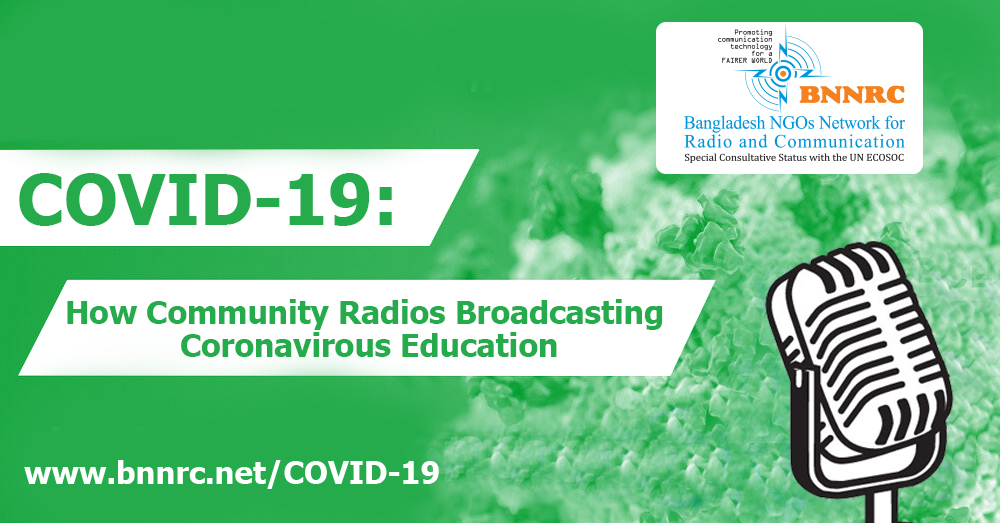
Bangladesh NGOs Network for Radio and Communication(BNNRC) has been mobilizing all community radios for developing and broadcasting awareness building programs on COVID-19: Coronavirus contamination to protect lives and livelihoods since March 1, 2020 in Bangladesh.
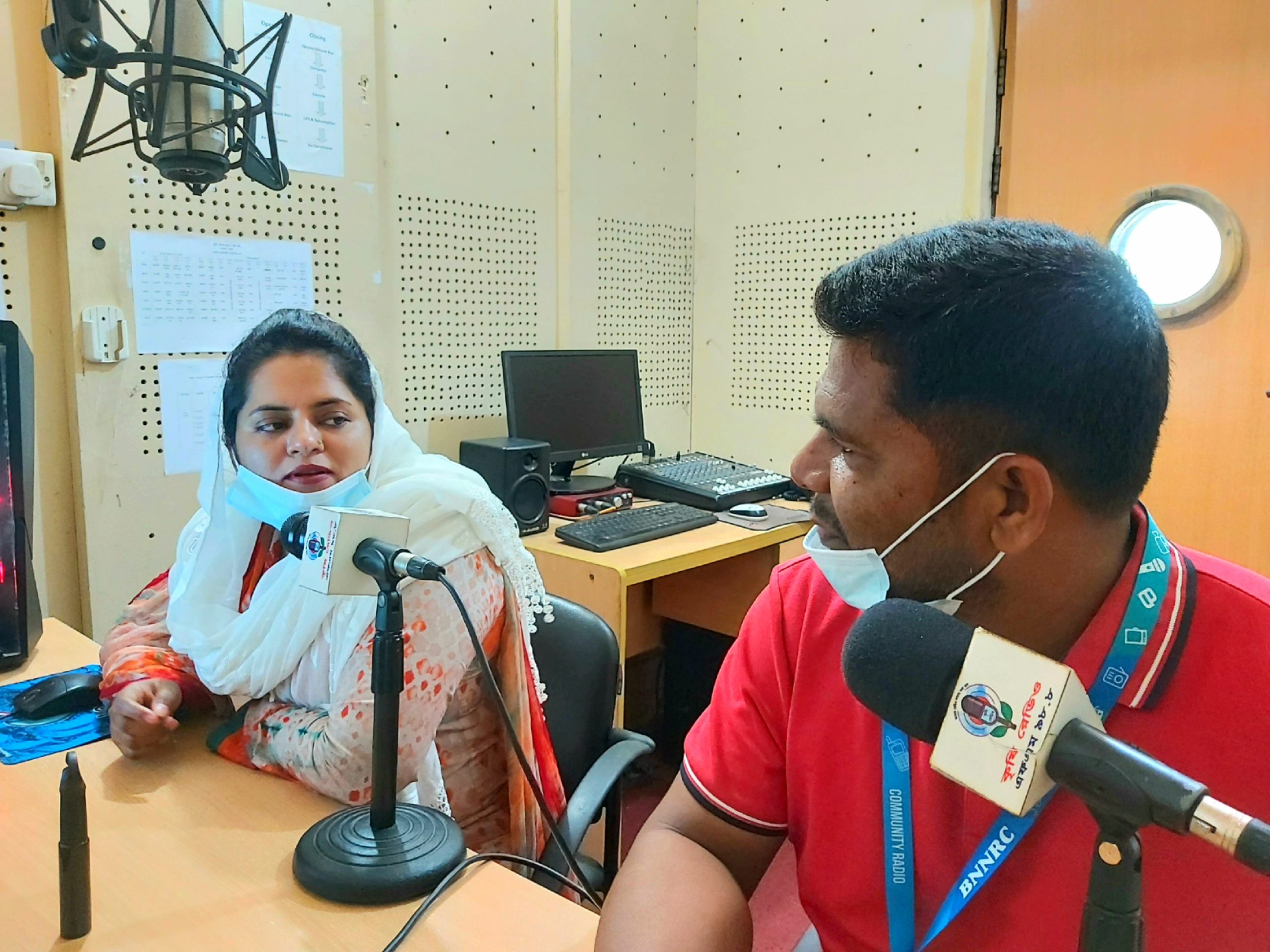
Programmatic interventions in response to COVID-19:
The COVID -19 demands cooperation among government, CSOs, local business communities, multi-stakeholders. BNNRC are continuing work 24×7 to reach rural communities in Bangladesh with life-changing information through the community radio. It’s not easy to get information to the hard-to-reach at the best of times, and we will continue to strive to make sure the needs of these communities are not forgotten. To that note, we’ll be continuing to share stories of our work, and the work of community broadcasters and rural people, while also supporting communities in getting the information they need about COVID-19.
In this perspective, BNNRC has been working on COVID -19 covering with the following issues:
1. Animate CSOs, Government, health service providers and communities for reinforcing collective action.
2. Keeping community people’s daily life normal and livelihood function
3. Mobilize further cooperation among government, CSOs, local market and communities’ responses
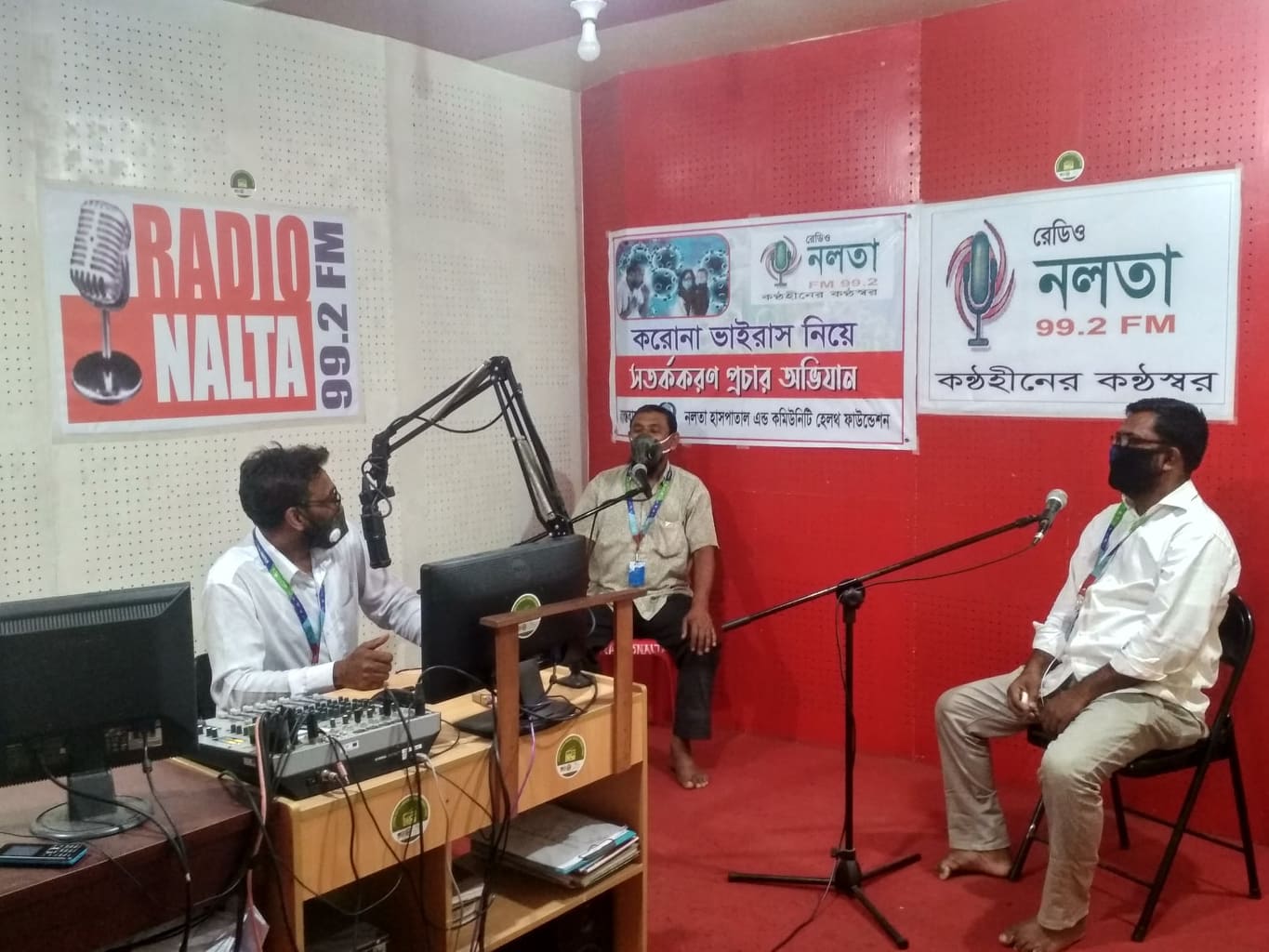
Actively distributing information and resources, including scripts and backgrounders, about how to plan and produce effective COVID-19 radio programming; Creating or activating spaces, such as social media groups, to give radio broadcasters a place to learn from each other about best practices in COVID-19 community radio programming; Developing connections between broadcasters and health authorities in government, and civil society to ensure accurate information goes out and myths are debunked; Reminding community broadcasters of the steps they can take to stay healthy; Commending community broadcasters and other journalists for being on the front line and continuing to work in these conditions.
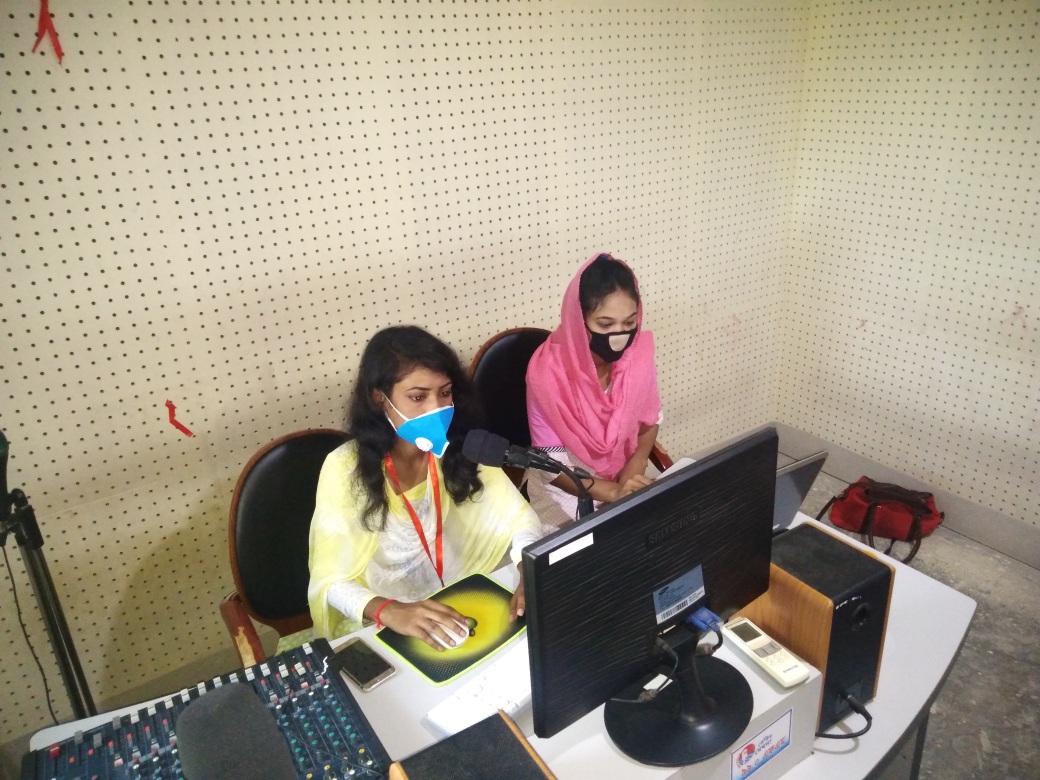
Future outlook and recommendations:
Community Radios stations, as one of the source of information, helping to raise awareness on COVID- 19 and reinforcing Behavior Change Communication (BCC) by CSOs, Government, health officials and locally elected bodies (LEB).
Community Radio stations are building awareness to change attitudes among community people at different points in their daily lives. Community Radio stations, as a platform for those who involve in COVID -19 responses to update rural communities. They are also providing a channel for two-way communication with community people where listeners are sending SMS or call in with questions.
Community Radio stations have been coordinating with the District and Upazila level Coronavirus Prevention Committees. Community Radio stations have assigned one broadcaster in each radio stations as the focal person to coordinate COVID – 19 programs.
Community Radio stations are broadcasting programs on COVID -19 in local languages or dialects. Community Radio stations are producing contents which speaks directly to localized issues and concerns, and features trusted local people in a way that nationally or regionally produced content cannot.
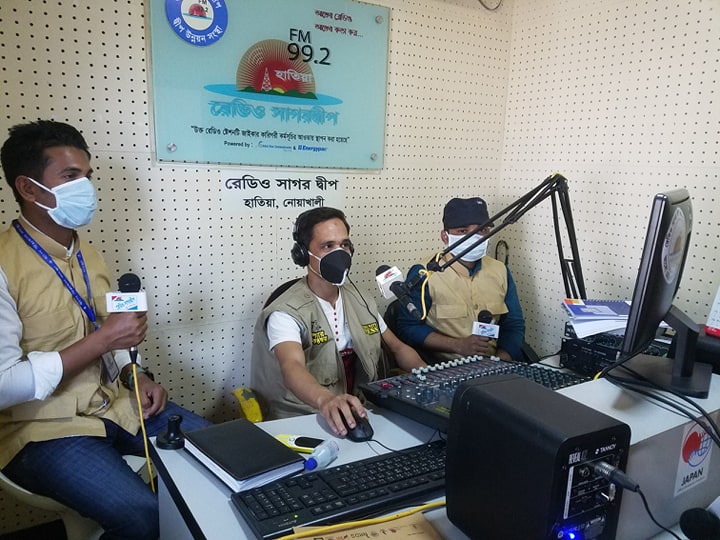
Challenges & Way forward
The rapid social distancing & Quarantine/ Isolation have caused massive pressure on the community radio sector extremely due to short notice. Fundraising process have been cancelled and revenues such as advertising income are drying up overnight resulting in immediate cash flow problems, cuts in grant-funded projects & many community radio stations have few or no cash reserve to tide them over situations like this.
There are things Government can do to help community radio stations to survive in this crisis so they can continue to serve communities.
(a) Upazilas and Districts administration (Local Government) could buy airtime from Community Radio stations.
(b) To substantially establish the Community Radio Trust Fund by Ministry of Information
© To establish a COVID-19 contents fund to support high quality and accurate local COVID-19 news reporting and the production of program or series of program that increase rural people understanding and contribute to psychological support during the present health emergency.
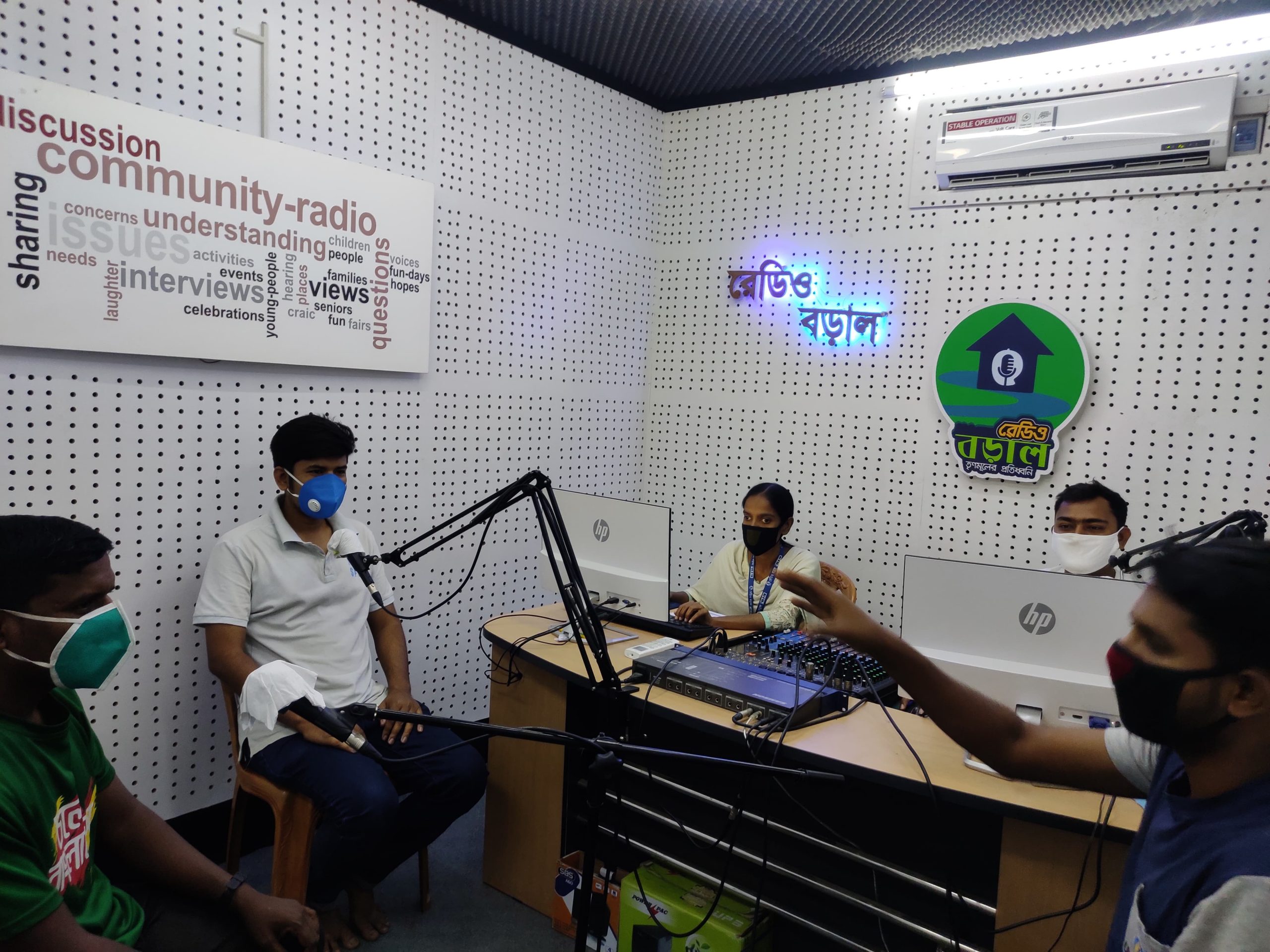
Implications:
It is really working and having a very positive effect at the rural communities. Community Radio stations help to reduce the panic of COVID – 19 gradually by broadcasting awareness programs. Now the community people are taking precautionary measures to prevent contamination of COVID – 19. People now understand more about the COVID – 19. Community Radio stations have already been established a well-trusted source of information for rural people of Bangladesh.
AHM Bazlur Rahman, Chief Executive Officer of Bangladesh NGOs Network for Radio and Communication(BNNRC)| bnnrcbd@gmail.com | +8801711881647 | www.bnnrc.net












